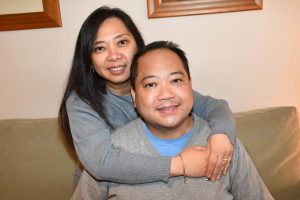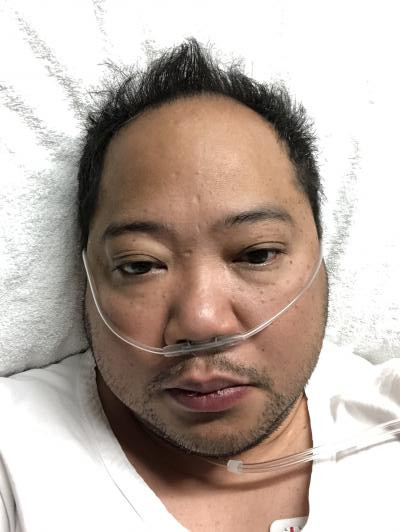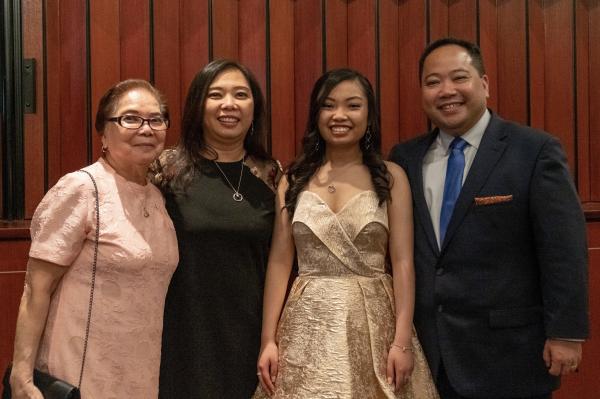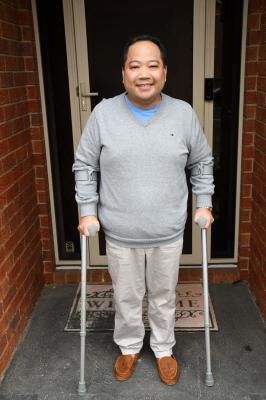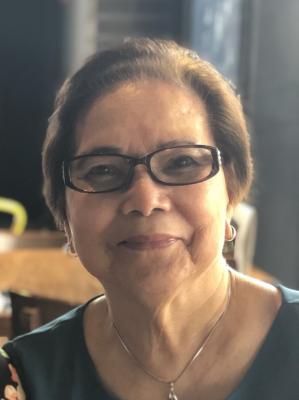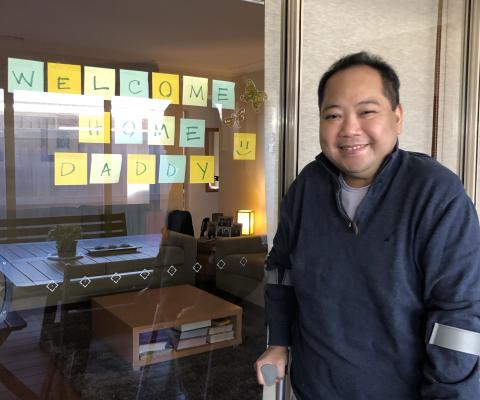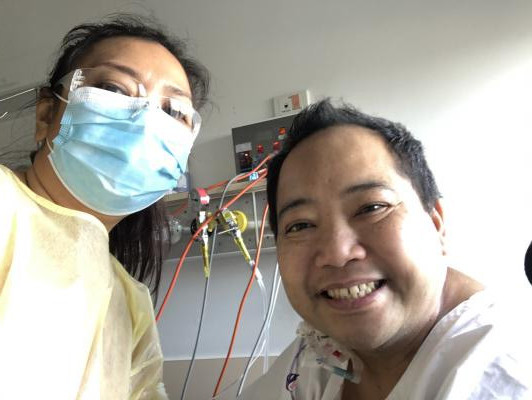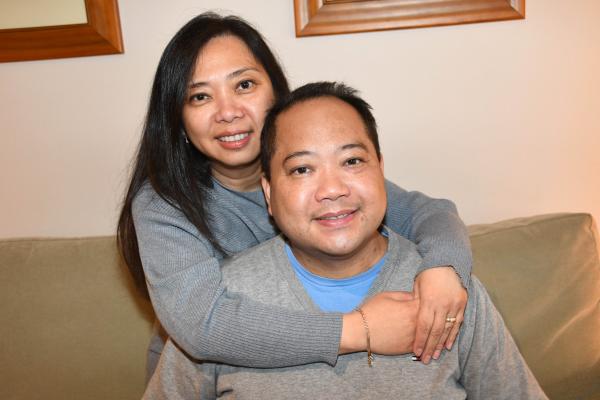
By Mitchell Clarke
A Berwick man who almost lost his life to Covid-19 has become the face of a statewide campaign to warn Victorians about the deadly virus.
Michael Rojales, 46, spent 72 days in hospital fighting coronavirus after first contracting it on the plane trip back from South Africa.
Mr Rojales arrived home on 19 March and tested positive four days later. Within two days, his condition worsened and he presented to hospital. By 29 March, he had been placed into an induced coma.
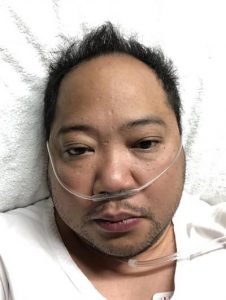
His inspiring story caught the attention of Premier Daniel Andrews, who shared his journey as part of the ‘Staying Apart Keeps Us Together’ campaign.
“I had a temperature and a mild cough and I thought I’d just go to the fever clinic to make sure I didn’t have corona … I thought it was unlikely but I wanted peace of mind,” Mr Rojales told the Gazette.
He got tested at the Gibb Street facility and was advised the following day that he did, in fact, have the virus.
“I couldn’t believe what I heard. How could I possibly have corona?”
Mr Rojales isolated at one end of the house, away from his wife, daughter and mother in law, but as his symptoms progressively worsened, he was taken to hospital.

“I just had this non-stop cough which I’ve described as like drowning. It’s almost like when you’re underwater and you’re struggling for air. You basically can’t breathe and when you get out of the water, you gasp for air but you fall in again,” he said.
“It was a horrible cough and it went on for one to two minutes before I could get air, but somehow breathing tickled my throat and I started coughing again. That was just happening over and over – it was a vicious cycle.”
Mr Rojales was taken to Casey Hospital before being transferred to Monash Clayton. At this point, the virus was still fairly new in Australia.
“There were a lot of things still unknown. Doctors said to me ‘for now, the best treatment is to put you into an induced coma’,“ he said.
“I didn’t really know what that meant and I wasn’t sure how long I’d be in that state, so I was just hoping for the best.”
For the next two weeks, Mr Rojales remained in an induced coma. He had stopped breathing on his own, which meant the ventilator was working at 100 percent. Doctors thought he had 24 hours to live.
“I had no idea what was happening, I was in dreamland and didn’t know the seriousness of what was going on,” he said.
He eventually woke on Easter Sunday to one of the nurses saying: “Hey Michael, your wife and many people are praying for you”. He didn’t fully understand why.
“Two weeks after I woke up, my wife told me exactly what happened. She said I almost died and the doctors told her to prepare for the worst and prepare to say goodbye to me,” he recalled.
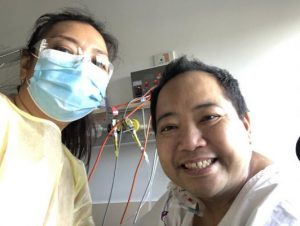
While Mr Rojales fought for life, wife Rachel, was dealing with an unimaginable situation.
She had also contracted the virus, as did her mother, Gely Constanilla, who tragically passed away on 6 April, after being admitted to hospital on 31 March.
“I was in the midst of my induced coma when she passed away,” Mr Rojales explained.
“On the day she died, the nurse called my wife. My mother-in-law was feeling a bit distressed, so my wife spoke to her as the nurse held her hand.
“My wife said: ‘Mama, I love you, be strong. Let me pray for you’. As soon as she said that, my mother-in-law peacefully passed away.
“One of the things that is very hard with corona, when people die, they don’t have their loved ones around them.”
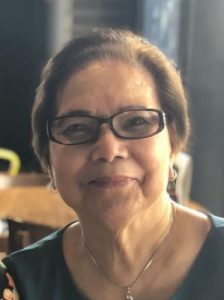
Mr Rojales own doctors were getting prepared to tell Mrs Rojales that she’d lose her husband too, but called The Alfred hospital in search of a last minute solution.
“They said ‘we’ve done everything we can, but nothing’s changed’,” Mr Rojales recalled.
“The Alfred doctors suggested to lie me on my stomach, which sounds simple and also very weird, but amazingly I started to breathe again at 50 percent, straight away.
“As the days went by, I just got better and better. We’re people of faith, so I can only attribute breathing again to the prayers of my church.”
Throughout his hospital stint, Mr Rojales developed pneumonia, anaemia, acute kidney failure and nerve damage.

After 72 days, he was finally deemed well enough to be discharged from hospital on 5 June.
“It was great to be home and in a different environment. I felt like furniture in the hospital,” he laughed.
“I’m still very immobile. I’m not able to walk or stand for long periods and my left leg is not weight bearing, but it was just great to be back with my family again.”
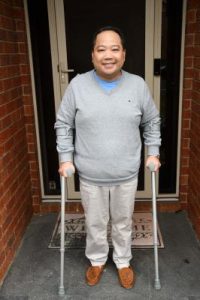
Having Mr Rojales home was the best possible outcome for 19-year-old daughter Megan, who witnessed the virus affect the people closest to her.
“For my daughter to see everyone she loved taken to hospital and not knowing whether they’d come back or not, that broke my heart,” he said.
Mr Rojales said the power of faith has allowed his family get through their darkest days.
“My faith in God has become even stronger. He’s given me a second chance at life and I don’t want to waste it. I want to help people as much as I can,” he said.
Prior to his hospital stay, Mr Rojales had never seen the inside of a ward. He was a healthy person and didn’t fall into a high risk category.
By sharing his story far and wide, he hopes to bring much needed awareness to the deadly virus, which continues to wreak havoc across the globe.
He said he “didn’t know how to feel” about being the face of the State Government’s campaign – which is currently running across social media and television – but said people needed to understand the seriousness of the situation.
“I do know I have a story to tell and I just want to help our community and our fellow Victorians be caring and careful through this interesting period of history,“ he said.
“We know that this virus is real but there are people out there that think this is just a cold, but different people are impacted in different ways by the virus. Some only get mild symptoms but some die.
“We don’t want anyone else to go through what we’ve been through.“
